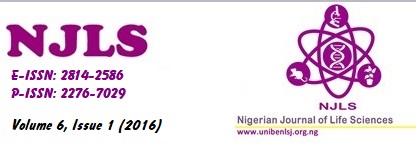OXIDATIVE STRESS IN RATS EXPOSED TO CRUDE OIL AND PROTECTIVE ROLE OF ENANTIA CHLORANTHIA
DOI:
https://doi.org/10.52417/njls.v6i1.305Keywords:
Antioxidant, Crude oil, Enantia chloranthia, Hepato-protection,Oxidative stress, RatsAbstract
Oral ingestion of crude oil represents a pathway for the delivery of potential toxicants to an
organism. Various toxicants have been shown to induce oxidative stress. The antioxidant
and hepato-protective role of Enantia chloranthia was evaluated in crude oil induced
oxidative stress in rats. Thirty male Wistar albino rats were randomly grouped into five with
six rats in each group. Phytochemical tests reveal the presence of saponins, flavonoids,
tannins, polyphenols, alkaloids and terpenoids. The biochemical parameters analyzed
indicated significant (p < 0.05) increase in the activities of alkaline phosphatase (ALP),
alanine transaminase (ALT), aspartate transaminase (AST) and malondialdehyde (MDA)
levels in rats gavaged with crude oil only when compared with control. Significant(p <
0.05) alterations was also observed in superoxide dismutase (SOD), peroxidase (POX)
and catalase (CAT) activities. However, the group of rats treated with chloranthia showed
significant reverse and restoration towards control values in a dose dependent manner.
This result indicates that crude oil generates oxidants that may induce oxidative stress.
The antioxidative effects of chloranthia in the crude oil treated animals emphasized its
hepato-protective role.

Published
Issue
Section
License
Copyright (c) 2016 https://www.unibenlsj.org.ng/index.php/njls

This work is licensed under a Creative Commons Attribution 4.0 International License.





